July 16:

THE FINAL MASTER (China, dir. Xu Haofeng)
Chen Shi (Fan Liao), the last remaining Master of the martial art of Wing Chun, arrives in Tianjin in hopes of opening a school to teach his discipline. Grandmaster Zheng (Shi-Chieh King) warns him that the martial world of Tianjin is insular, and he will not be allowed to establish himself directly—in order to open a school, Chen Shi would have to defeat the masters of eight other Tianjin schools—but that he may train a local to fight on his behalf. Chen marries beautiful but disgraced Tianjin native Zhao Guohui (Jia Song) and begins training Geng Liangchen (Yang Song), a “coolie” who also happens to be a martial arts prodigy. But forces both inside and outside the martial world conspiring against Chen and his student may lead to the end of Wing Chun despite their best efforts. THE FINAL MASTER is the third film by wildly idiosyncratic director Xu Haofeng, and it arrives at Fantasia after receiving a brief theatrical run in a handful of North American theaters last year. Like his previous films THE SWORD IDENTITY and JUDGE ARCHER, a dense web of machinations form the backdrop to its main storyline, which is punctuated by a series of fight scenes very unlike anything else being made today. It feels like there are fewer action sequences than in his previous features, but that scarcity is more than made up for with a lengthy, spectacular final fight. It probably won’t win Haofeng any converts, but THE FINAL MASTER is another unique feature from one of the most interesting filmmakers currently working in China.
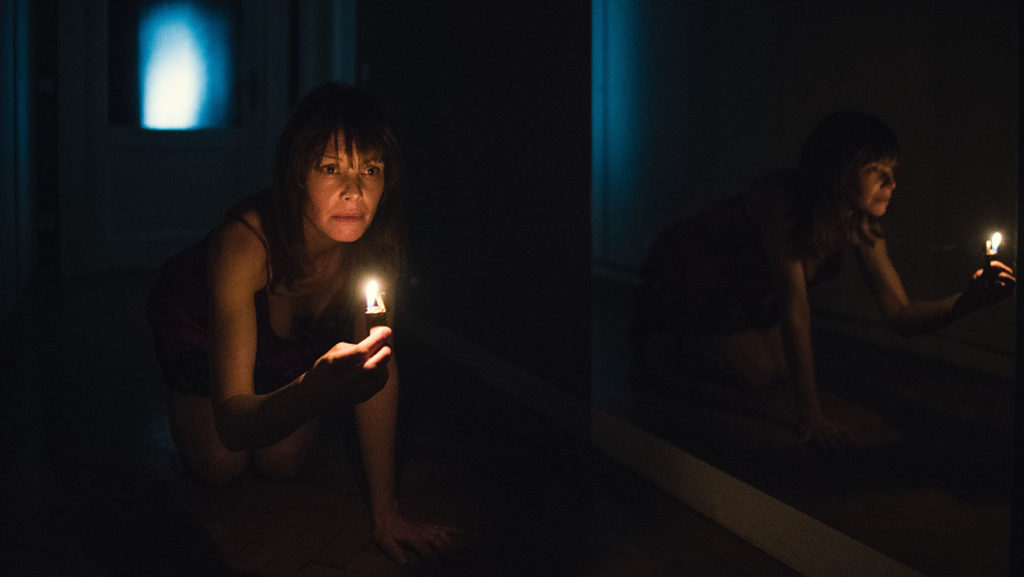
ANIMALS (Austria, dir. Greg Zglinski)
Nick (Philipp Hochmair), a professional chef, and his wife Anna (Birgit Minichmayr), an author of children’s books, are taking a six-month sabbatical from city life so Nick can work on a new cookbook and Anna can focus on her first novel aimed at adult readers. They enlist Mischa (Mona Petri) to house-sit for them, but before she even makes it out of the building with their keys she slips on a skateboard and suffers a concussion. On the way to their cabin, Nick and Anna have a car accident that leaves Anna with a head injury as well. As time begins to move strangely, the tensions in Nick and Anna’s marriage begin to surface in unsettling ways. Meanwhile, after Nick and Anna’s upstairs neighbor Andrea (with whom Nick had been carrying on an affair) commits suicide, Mischa is stalked by Andrea’s ex-boyfriend, who believes Mischa is Andrea. ANIMALS takes a cue from Robert Altman’s IMAGES and its countless imitators by placing its lead characters in a remote location and breaking down reality around them to obscure what is “really happening” and what may be hallucination or madness. Unfortunately, it’s never made clear what actually is going on in either of the film’s parallel storylines other than that it seems that every character has some sort of head trauma that might explain away everything (or nothing). Despite a few effective moments of dread, ANIMALS is too focused on being impenetrable to be satisfying on a dramatic level.
July 17:

HAVE A NICE DAY (China, dir. Jian Liu)
This might sound familiar: a group of none-too-bright low-level criminals chase a bag of money around a city, their paths criss-crossing over the course of one eventful evening. The big twist in HAVE A NICE DAY is that this story is presented as an animated feature as opposed to live action. As such, it’s disappointing that nothing much is really done with the medium. One character has a couple of sci-fi inventions he uses sparingly, and there’s a brief (although very funny) reverie between two characters presented as a karaoke video that also looks like a propaganda film. The animation is quite basic, mostly just one step up from a typical Adult Swim show, and the drawing of the characters is similarly spare. This is a problem in that it’s tough to read much emotion in them, and likewise the backstories for all the characters are virtually nonexistent. It has its modest moments, and the whole thing runs under 80 minutes including credits, but HAVE A NICE DAY feels more like a long proof-of-concept video than a full-fledge feature film.
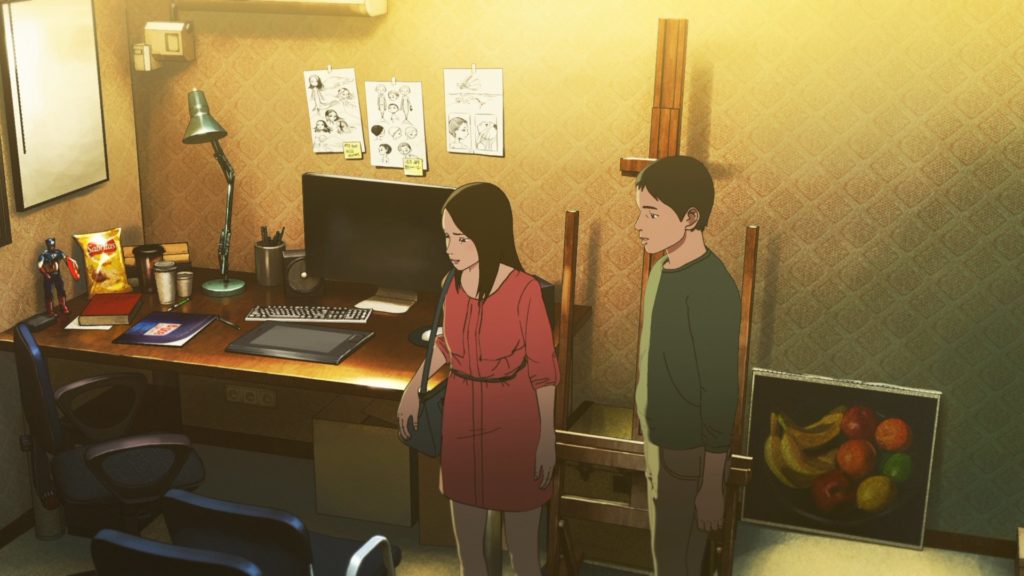
SENIOR CLASS (South Korea, dir. Hong Deok-pyo)
Shy college art student Jung-woo is fixated on his beautiful and talented classmate Ju-hee, but she seems utterly unapproachable to him. He writes and illustrates a webcomic about his longing, but his best friend Dong-hwa is less interested in romance than in conquest. One night Jung-woo reluctantly agrees to run an errand to a hostess club for Dong-hwa and is shocked to find Ju-hee works there to make money for school. She asks Jung-woo to keep his discovery secret, instantly creating a bond and a precarious power dynamic between them. SENIOR CLASS is a low-key drama about young people making bad decisions that happens to feature a few explicit sex scenes, but its real hook is that it is not live action. The film uses the same style of CG animation as SEOUL STATION, which was directed by this film’s co-writer and producer Yeon Sang-ho. From certain angles, its characters look hand-drawn, but they are actually 3D models. The detail in the faces of the characters is often striking and effective in conveying a wide range of emotions, but wider shots and especially the characters’ somewhat stilted walking reveal the style’s limitations. Like HAVE A NICE DAY, another animated feature at this year’s Fantasia, SENIOR CLASS does little with the possibilities offered by animation over live action. Other than the short sequences animating Jung-woo’s web comic, there’s nothing fantastical about the action of the film. It’s refreshingly frank and unafraid to paint its young characters in a deeply unflattering light as they struggle with their emotions and the consequences of their actions, but it’s tough not to be distracted by wondering why this story was told in this particular manner.
July 18:
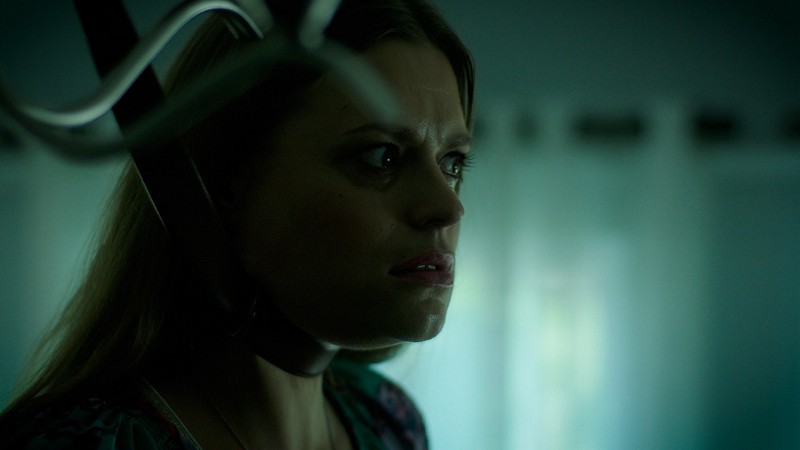
BITCH (USA, dir. Marianna Palka)
Following an unsuccessful suicide attempt that none of her family notices, Jill (writer/director Marianna Palka) confronts her monstrously selfish husband Bill (Jason Ritter) about the toll the stresses of her life is taking on her. Bill works constantly and maintains an affair with a co-worker, leaving Jill to take care of the house and their four kids entirely on her own. When Bill reacts to Jill’s desperate plea for help with anger and disgust, Jill snaps. Stripping naked and locking herself in the basement of their home, Jill begins to behave like a wild dog. This happens at the worst possible time for Bill, whose company is in serious jeopardy. He asks Jill’s sister Beth (Jaime King) for help, but she quickly becomes overwhelmed when she realizes the state of her sister’s life and marriage. For his part, Bill seems mostly worried that someone outside the family will find out about Jill’s behavior, and his self-centered nature may result in serious repercussions for his entire family. BITCH was clearly a passion project for its star/writer/director, but its schizophrenic tone will likely confound most viewers. Its opening suicide scene is harrowing, but it and other similarly unpleasant scenes (Palka is genuinely scary as Jill the “dog”) are jarringly scored with “wacky” music. The score uses the mouth harp more than probably every movie made in the last year combined. This tonal dissonance only gets worse when the film attempts to make a sharp turn from dark comedy to earnest family drama as Bill learns some important lessons about family. The cast does great work with the material, but the film’s uncomfortable mish-mash of tones will probably not sit well with most audiences.
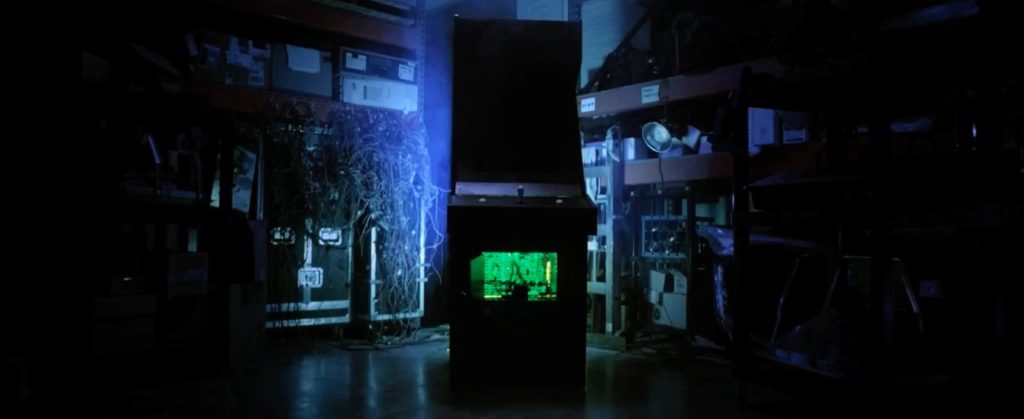
SEQUENCE BREAK (USA, dir. Graham Skipper)
Oz (Chase Williamson) is a young loner who repairs old arcade machines for Jerry (Lyle Kanouse) full-time. Sadly the business is on the brink of closing, and after breaking the news Jerry orders Oz to go out and get drunk while Jerry prepares to leave town for a couple of weeks. At the bar Oz runs into Tess (Fabianne Therese), who had been in the shop earlier that day to shop for a birthday present. While Oz and Tess get to know each other, a man (John Dinan) sneaks into the shop and leaves a package—a circuit board. Oz finds the board and installs it, and soon after he plays it strange things begin happening that distract him from his budding romance with Tess. The game has a powerful hold over Oz that he can’t explain, and the gameplay sessions start to look less like old school arcade play than Cronenbergian body horror. Can he discover the secret of the game before it consumes him? SEQUENCE BREAK is the debut feature as writer/director for actor Graham Skipper, who has made a name for himself in popular indie horror films such as THE MIND’S EYE and BEYOND THE GATES. This is very much cut from the same cloth both in its casting (Williams co-starred in BEYOND THE GATES, Therese appeared in SOUTHBOUND and STARRY EYES) and in its look and feel, including a synth score by Van Hughes. Cronenberg is clearly the principal influence here, with an arcade machine’s joystick and buttons changing into gooey (sex?) organs and all manner of unidentifiable liquids oozing onto and out of its circuit board. There is some impressively weird imagery here and some great practical effects and low-tech visual trickery, but overall SEQUENCE BREAK feels a little slight. There’s just not much to it, although it is done well. This could be a side effect of Skipper wanting to avoid the pitfall of many debut filmmakers who can’t seem to get out of their own way; at 80 minutes, the film never wears out its welcome.
- [CINEPOCALYPSE 2017] FIVE FILMS YOU CAN’T MISS AT CINEPOCALYPSE! - October 31, 2017
- Hop into Jason’s Ride for a Look at the Wild World of Vansploitation! - August 11, 2014
Tags: Animation, Austria, Canada, Chase Williamson, China, Fantasia Film Festival, Graham Skipper, Haofeng Xu, Jaime King, Jason Ritter, Marianna Palka, Montreal, Song Yang, South Korea, Wing Chun

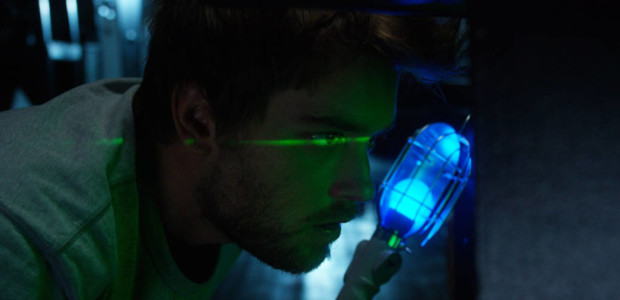



No Comments